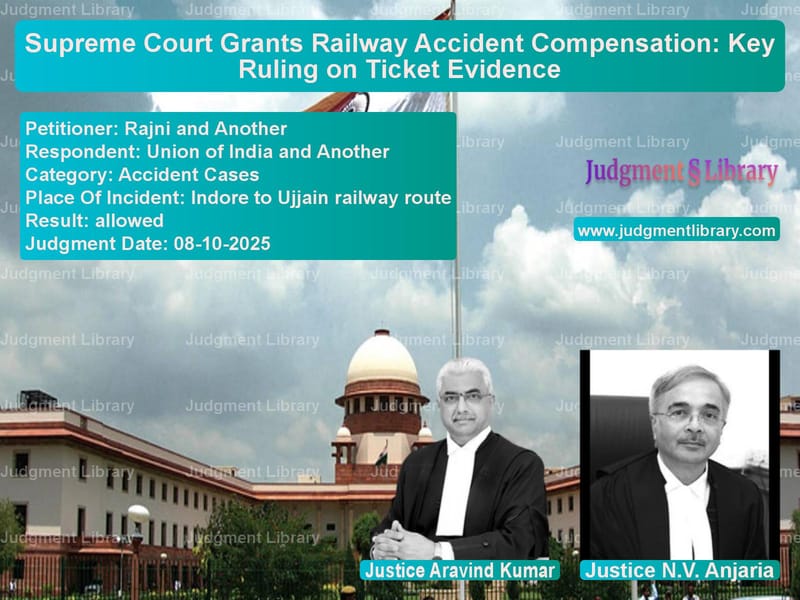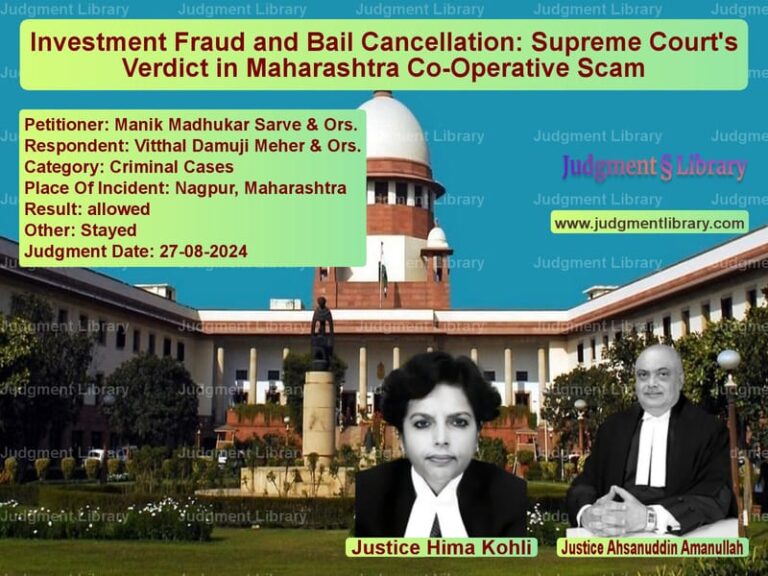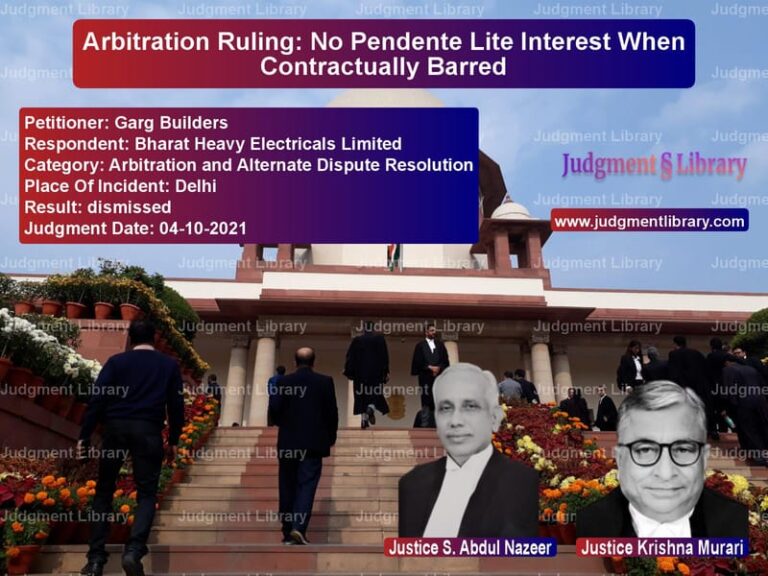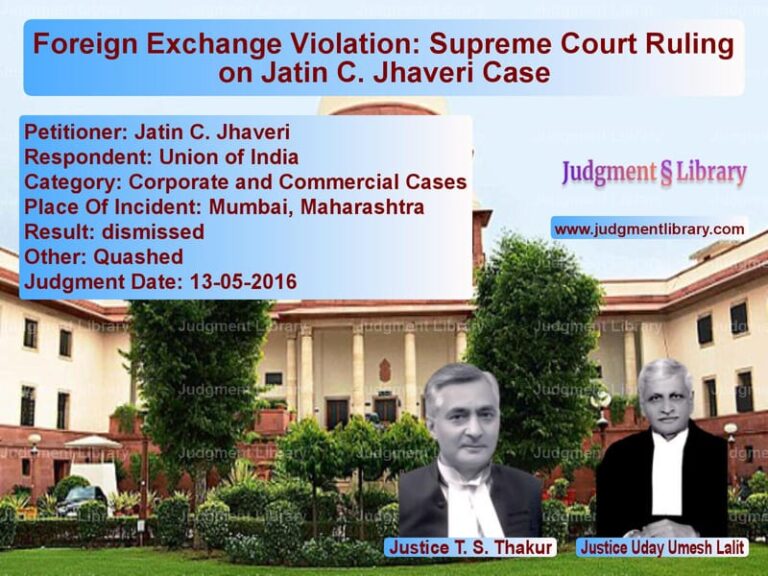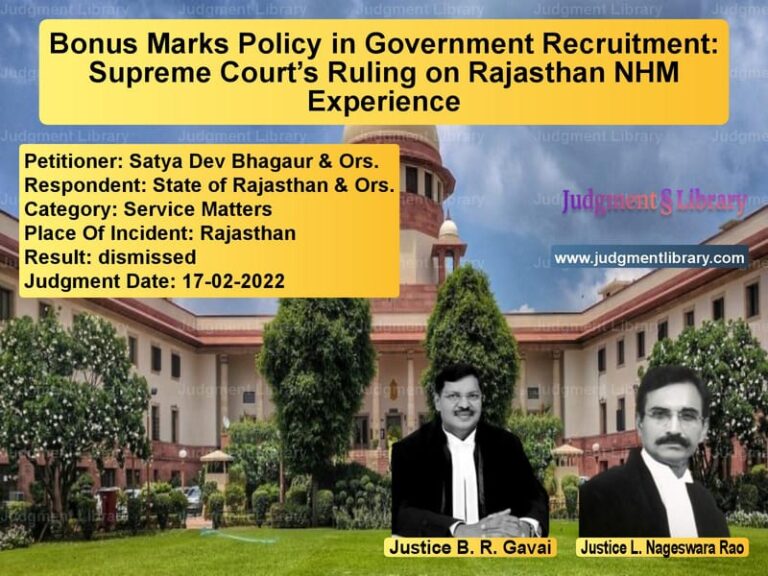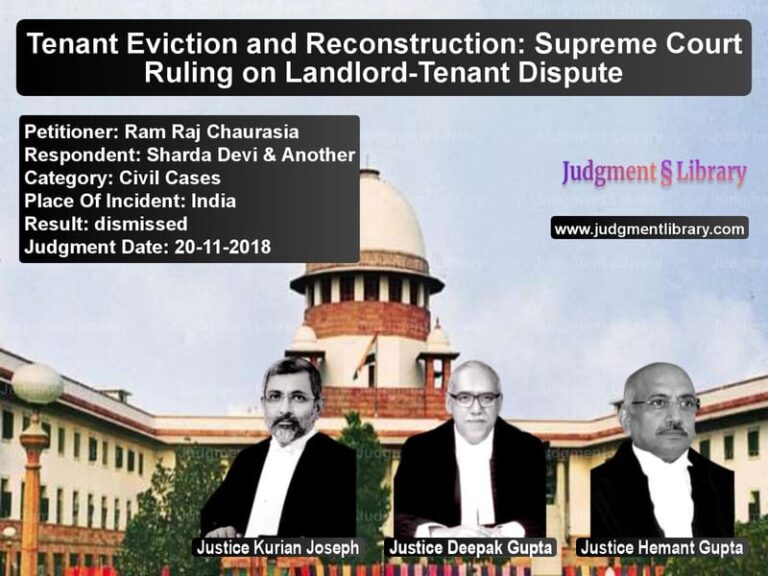Supreme Court Grants Railway Accident Compensation: Key Ruling on Ticket Evidence
In a landmark judgment that reinforces the welfare-oriented approach to railway accident claims, the Supreme Court of India has granted compensation to the family of a man who died after falling from a train, setting aside the decisions of both the Railway Claims Tribunal and the High Court. The ruling, delivered on October 8, 2025, establishes crucial principles about the standard of proof required in such cases and prevents technical procedural lapses from defeating legitimate claims.
The case involved an appeal by Rajni and her minor son against the Union of India and another respondent, challenging the dismissal of their claim petition seeking compensation for the death of Sanjesh Kumar Yagnik in an alleged railway accident on May 19, 2017. The deceased was stated to have purchased a second-class ticket at Indore Railway Junction for travel to Ujjain by Ranthambore Express when, due to overcrowding, he was pushed out of the running train near pole no. 15/21, resulting in fatal head injuries.
The appellants, being the widow and minor son of the deceased, had filed Claim Case No. OA-IIU/BPL/96/2019 before the Railway Claims Tribunal, Bhopal, seeking compensation of ₹12,00,000. However, the Tribunal dismissed the claim petition on the ground that claimants had failed to prove the deceased was a bonafide passenger, noting that no ticket was recovered from his person or belongings, and the photocopy of tickets was considered doubtful as there was no seizure memo and the investigating officer was not examined.
When the appellants approached the High Court through Miscellaneous Appeal No. 3451 of 2023, the court, while accepting that the incident constituted an “untoward incident” under Section 123(c)(2) of the Railways Act, nonetheless concurred with the Tribunal’s finding that the deceased was not proved to be a bonafide passenger. The appeal was accordingly dismissed on May 15, 2024.
Before the Supreme Court, the learned counsel for the appellants made compelling arguments, relying on established precedents. He contended that “mere non-recovery of ticket is not fatal, and once prima facie proof is given, the burden shifts on the Railways to disprove the said fact.” He further argued that “deceased had indeed purchased ticket no. L10274210 at 05:36 hours on the date of incident, as reflected in records” and that “the failure of the investigating officer to prepare a seizure memo ought not to prejudice the dependants.” The counsel also pointed out that “on a busy corridor such as Indore–Ujjain, the Railways could have produced ‘best evidence’ like CCTV, guard logs, or alarm-chain records.”
Opposing these arguments, Ms. Rukhmini Bobde, learned counsel appearing for the respondents, supported the concurrent findings of the lower courts. She submitted that “no cogent primary evidence exists to establish that deceased was holding a valid ticket for the fateful journey” and that “the photocopy produced was neither recovered at the spot nor proved through a seizure memo or testimony of witness establish that deceased had purchased the ticket.” She emphasized that “the concerned officer was not examined; and there is no contemporaneous record of an alarm or report of a fall from the running train in that sector” and therefore, “in absence of prima facie proof of bonafide travel, compensation under Section 124-A cannot be awarded.”
The Supreme Court, after careful consideration of these arguments and the evidence on record, delivered a judgment that significantly clarifies the legal position regarding railway accident claims. The Court began by examining the legal framework, noting that “Section 124-A of the Railways Act, 1989 embodies a no-fault regime for ‘untoward incidents’, but compensation remains predicated on the victim being a ‘passenger’.” The Court referred to Explanation (ii) to Section 124-A, which defines a passenger as including “a person who has purchased a valid ticket for travelling, by a train carrying passengers, on any date or a valid platform ticket and becomes a victim of an untoward incident.”
The Court extensively relied on its previous decision in Union of India v. Rina Devi, where it had affirmed that “compensation under Sections 124/124-A is payable ‘whether or not there has been wrongful act, neglect or fault'” and clarified that “mere non-recovery of a ticket from the victim’s person is not ipso facto fatal where the claimant lays a credible prima facie foundation, upon which the onus may shift to the Railways.”
Examining the evidence in the present case, the Court noted that the appellants had discharged their initial burden through the affidavit of the deceased’s wife and the Divisional Railway Manager (DRM) report dated February 23, 2019. The Court particularly emphasized the significance of the DRM report, which stated: “Ticket Verification: – In the documents received from Police Station Narwar in relation to the incident of 19.05.2017, the train travel ticket no. L10274210 from Indore to Ujjain has been verified by the Chief Booking Supervisor Indore on 19.05.2017 and it is stated that the said ticket was issued from Indore Station.”
The Court further reinforced its position by referring to Doli Rani Saha vs. Union of India, where it was held that “the burden of proof would shift to the Railways once, the Claimant-Appellant filed an affidavit stating the facts and adverting to the report arising from the investigation conducted by the railway authorities.” Quoting from Rina Devi, the Court reiterated: “We thus hold that mere presence of a body on the railway premises will not be conclusive to hold that injured or deceased was a bona fide passenger for which claim for compensation could be maintained. However, mere absence of ticket with such injured or deceased will not negative the claim that he was a bona fide passenger. Initial burden will be on the claimant which can be discharged by filing an affidavit of the relevant facts and burden will then shift on the Railways and the issue can be decided on the facts shown or the attending circumstances.”
The Supreme Court made several crucial observations about the nature of proceedings under the Railways Act. The Court strongly criticized the hyper-technical approach adopted by the lower courts, stating: “This reasoning ignores the consistent judicial line that the absence of formal seizure or witness examination does not, by itself, negate bonafide travel when other material evidence substantiate the claim. Mere technical irregularities or lapses in procedure should not defeat a legitimate claim under a welfare statue, like the Railways Act, 1989.”
The Court further elaborated on this principle in powerful terms: “A Hyper technical approach which would frustrate the object of providing relief to victims of railway accidents should be eschewed. The insistence on a formal seizure memo would amount to importing standard of proof which normally is sought for in a criminal trial.”
In a significant declaration that will guide future cases, the Court stated: “Hence, we reaffirm that proceedings under Section 124-A of the Railways Act are not criminal trials demanding proof beyond reasonable doubt, but welfare statues are governed by the principles of preponderance and probabilities. Once the foundational facts of (i) possession or issuance of a valid ticket, and (ii) occurrence of an accidental fall from a train, are established through credible material, the statutory presumption of bona fide travel must operate in favour of the claimant.”
The Court emphasized the responsibility of the Railways as an instrumentality of the State, observing that “The Railways, as an instrumentality of the State, cannot defeat such claims by pointing to procedural imperfections in investigation or non-examination of formal witnesses. To hold otherwise would erode the beneficial character of the legislation and convert a social-justice remedy into a forensic obstacle race.”
The judgment established a clear principle for future cases: “It is therefore declared that where an official railway inquiry or evidentiary record verifies the issuance of a ticket corresponding to the date and route of an untoward incident, such verification shall constitute prima facie proof of bona fide travel, shifting the evidentiary burden on the Railway Administration. The absence of a seizure memo, or the inability of the police to preserve physical evidence, cannot by itself defeat a legitimate claim when the totality of circumstances supports the claimant’s version.”
The Court concluded by setting aside the judgments of both the Railway Claims Tribunal and the High Court and allowing the claim petition in part. The respondents were directed to pay compensation of ₹8,00,000 to the appellants within eight weeks, failing which the amount would carry interest at 6% per annum from the date of the order.
This judgment represents a significant step forward in ensuring that the welfare objectives of the Railways Act are not defeated by procedural technicalities. It balances the need for genuine verification of claims with the recognition that in the chaotic circumstances of railway accidents, perfect documentation and procedural compliance cannot always be expected. The ruling ensures that families who have suffered tragic losses due to railway accidents receive the compensation intended by Parliament without being subjected to unrealistically high standards of proof.
Petitioner Name: Rajni and Another.Respondent Name: Union of India and Another.Judgment By: Justice Aravind Kumar, Justice N.V. Anjaria.Place Of Incident: Indore to Ujjain railway route.Judgment Date: 08-10-2025.Result: allowed.
Don’t miss out on the full details! Download the complete judgment in PDF format below and gain valuable insights instantly!
Download Judgment: rajni-and-another-vs-union-of-india-and-a-supreme-court-of-india-judgment-dated-08-10-2025.pdf
Directly Download Judgment: Directly download this Judgment
See all petitions in Compensation Disputes
See all petitions in Road Accident Cases
See all petitions in Negligence Claims
See all petitions in Worksite Accidents
See all petitions in Hit and Run Cases
See all petitions in Judgment by Aravind Kumar
See all petitions in Judgment by N.V. Anjaria
See all petitions in allowed
See all petitions in supreme court of India judgments October 2025
See all petitions in 2025 judgments
See all posts in Accident Cases Category
See all allowed petitions in Accident Cases Category
See all Dismissed petitions in Accident Cases Category
See all partially allowed petitions in Accident Cases Category

